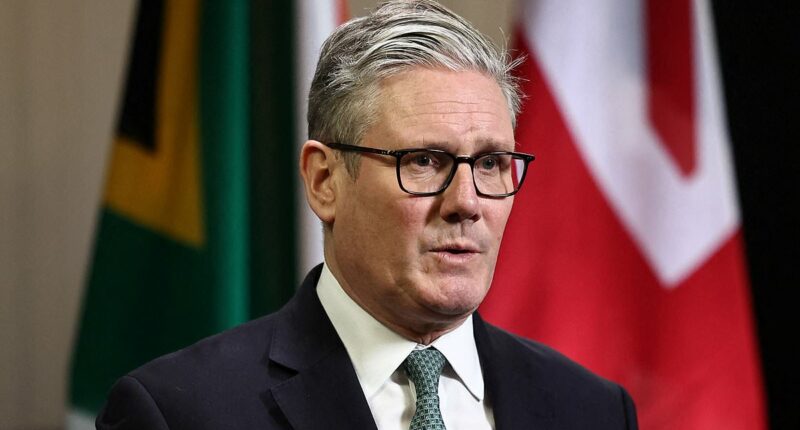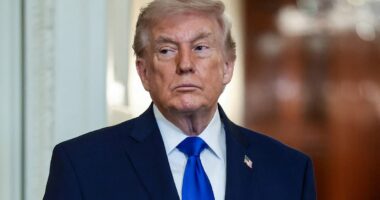Share this @internewscast.com
In a bid to rebuild public trust, Parliament’s standards overseer has called on Members of Parliament to refrain from accepting complimentary gifts and perks.
Daniel Greenberg, who serves as the Parliamentary Commissioner for Standards, emphasized the importance of MPs regularly evaluating their actions through the lens of public perception.
Having spent nearly three years addressing ethical controversies, Mr. Greenberg pointed out that the issue of voter trust in MPs remains a significant challenge.
He noted the absence of a “radical change” since the Labour Party assumed power in July 2024, despite pre-election commitments from Sir Keir Starmer to eradicate the “chaos of sleaze.”
The early months of the Prime Minister’s tenure were overshadowed by a controversy over gifts, with Labour leaders, including Starmer, facing intense scrutiny over the acceptance of various freebies.
Amid the uproar, which led to the moniker “Free Gear Keir,” the Prime Minister was compelled to return £6,000 worth of gifts and hospitality, including sought-after tickets to a Taylor Swift concert.
Chancellor Rachel Reeves vowed to no longer accept free tickets after she was criticised for taking a family member to see Sabrina Carpenter without paying.
Sir Keir, Ms Reeves and then-deputy PM Angela Rayner also pledged to no longer accept free clothing, after it was revealed donors were funding their wardrobes.

Daniel Greenberg said there had not been a ‘radical change’ since Labour came to power in July 2024, despite Sir Keir Starmer ‘s pre-election promise to ‘end the chaos of sleaze’

Labour’s ‘freebies’ row came after top ministers – including Sir Keir – accepted lavish gifts from party donor Lord Alli
But the PM continues to accept free tickets to Arsenal matches, having argued he cannot use his normal seats in the stands due to security concerns.
In an interview with Times Radio, Mr Greenberg said it was important the House of Commons ‘self-regulates’ and stressed it was not for him to tell MPs how to act.
But he suggested politicians should voluntarily decide to not accept hospitality and gifts, if taking freebies would lead voters to question their ‘integrity’.
‘I would like to think that members would constantly benchmark for themselves everything they do against the simple test,’ he said.
‘Does this increase the level of trust between me and the public, or does it decrease it?
‘So if a gambling company offers me, as an MP, they offer me tickets to Wimbledon. I would like to think an MP would say to herself or himself, ‘how does this relate to trust?’
‘If I take these tickets, will that make people think that I’m more independent? Would it make them think that I’ve got greater integrity and selflessness, which is underpinning trust? Or will it damage that perception?
‘I think it’s terribly important that the House self-regulates. It’s not for me ever to tell MPs, ‘you should do this, you shouldn’t do that’.
‘I think my role is to constantly remind them of the things they want to think about in deciding for themselves their own actions.’
Asked why MPs should not simply be banned from accepting gifts, Mr Greenberg added: ‘I think if an MP decided to say for themselves that they weren’t going to accept any hospitality, or they weren’t going to accept any gifts.
‘If they decided to say that for themselves and they felt that was likely significantly to increase the level of trust between them and their constituents.
‘That they could go to their constituents and say, ‘you can be sure nobody is buying my favour, because I don’t take gifts, I don’t take hospitality’.
‘If an MP felt that was the appropriate thing to do. I would certainly understand why they did it.’
Mr Greenberg acknowledged that MPs had failed to treat the 2024 general election as a ‘fresh start’, following a series of ‘sleaze’ rows in the previous parliament.
‘I would not say there has been a radical change,’ he added. ‘I would gauge that by the kind of issues that I’m asked to investigate are very similar to the ones I was looking at before.
‘One thing that I think is hopeful, and this is a change, more and more MPs are coming for advice in advance.
‘Like most regulators, I would so much prefer to help raise and support good standards than sit there waiting for things to go wrong and then punish them.
‘But overall, has there been a radical, clear change in levels of public trust based on change of clear change of behaviour? I honestly can’t say that there has.’

















